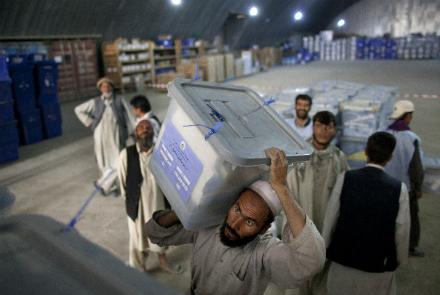The Independent Election Commission of Afghanistan (IEC) on Monday began the crucial phase of the process leading to the presidential elections — including the scrutiny of nomination papers to exclude ineligible candidates from the race, a day after the election management body of the country completed the process of receiving nomination papers from prospective candidates who are expected to compete in the historic elections scheduled for July 20 of this year.
“Those who have registered, in case they do not complete the criteria following the completion of the assessments, will not make their way to the final list,” said Abdul Aziz Ibrahimi, deputy spokesman for IEC.
Meanwhile, election observers have reiterated the call on the Afghan government, and other stakeholders involved in the process, to deliver on their promises regarding reforms in the election commission.
Election observers have apparently outlined a five-item reform package to be swiftly implemented by the government. The reform package includes: replacement of members of the election commissions, reforms in the voter lists, ensure the use of biometric devices in the elections, determining the polling stations and enhancing the capacity of IEC’s provincial offices.
“Our findings reveal that it is impossible to go towards the presidential elections in its present capacity and structure,” said Naeem Ayoubzadah, CEO of Transparent Election Foundation of Afghanistan (TEFA).
“Final decisions by the electoral complaints commission on the final results have a key role in determining the credibility of the process,” said Marwa Amini, spokesman for Free and Fair Election Forum of Afghanistan (FEFA).
On January 3, the IEC officially started the registration process for presidential elections.
The candidates who have entered the election race and have registered so far are: former member of Afghanistan’s parliament Abdul Latif Pedram, incumbent President Ashraf Ghani, incumbent Chief Executive Abdullah Abdullah, former national security advisor Mohammad Hanif Atmar, former foreign minister Zalmai Rassoul, former minister of interior Noorul-haq-Ulumi, former Afghan ambassador to India Shaida Mohammad Abdali, Sayed Noorullah Jalili, Enayatullah Hafiz, leader of Hizb-e-Islami Gulbuddin Hekmatyar, Ahmad Wali Massoud, Noor Rahman Laiwal and former NDS chief Rahmatullah Nabil, Mohammad Hakim Torsan and ex-director general of the Center for Strategic Studies of the Ministry of Foreign Affairs, Faramarz Tamanna.
President Ashraf Ghani and Chief Executive Abdullah Abdullah on Sunday officially entered the race for July 20 presidential elections, setting up a rematch, following 2014 presidential elections marred by allegations of systematic fraud and massive irregularities by the two leading candidates, Ghani and Abdullah.
The irregularities in the 2014 elections led to the formation of the national unity government after three months of a political stalemate. Ghani and Abdullah signed a power-sharing agreement brokered by the then US Secretary of State, John Kerry.
Afghans prepare for voting in the presidential elections at a time when some of Afghanistan’s mainstream political parties and elite have constantly raised speculation and apprehension over the leadership of the election commission, following the irregularities and poor management seen in the October 20 parliamentary elections. But IEC officials have defied criticism, in saying that election irregularities weren’t on a scale to question the entire process. Election observers have warned there would be fallout for the country after the presidential elections if systematic reforms weren’t brought in to the election process.



Comment this post